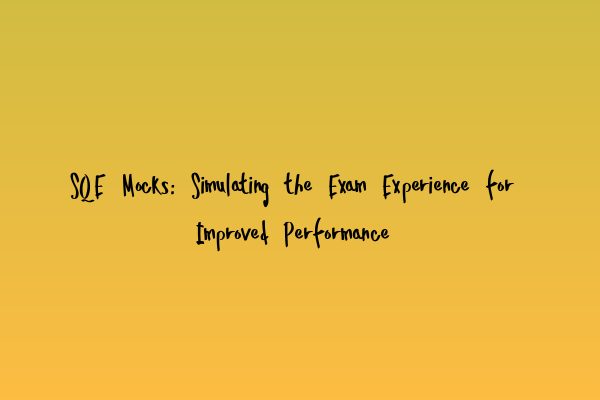SQE Mocks: Simulating the Exam Experience for Improved Performance
Hello and welcome to SQE Exam Law’s blog, your one-stop resource for all things related to the Solicitors Qualifying Examination (SQE). Today, we are here to discuss the importance of SQE mocks and how they can significantly enhance your performance in the actual exam. Whether you are a student preparing for the SQE or a professional seeking to stay up-to-date with the latest developments, this blog post is for you.
The Importance of SQE Mocks
Preparing for any exam can be a daunting task, and the SQE is no exception. The introduction of a two-part exam has brought about significant changes requiring a strategic and focused approach. In this context, SQE mocks serve as invaluable tools in helping you familiarize yourself with the format and content of the exam.
By simulating the exam experience, SQE mocks allow you to identify any knowledge gaps, areas of weakness, or time management issues that need to be addressed. Additionally, they provide an opportunity to fine-tune your exam technique, build confidence, and overcome the anxiety associated with high-stakes exams.
Simulating the Exam Experience
Simulating the exam experience accurately is key to maximizing the benefits of SQE mocks. This means replicating the exam conditions as closely as possible, including the time constraints, format, and question types. At SQE Exam Law, we have carefully crafted mock exams that reflect the actual SQE, ensuring a realistic and valuable practice experience.
Our SQE mock exams are designed to cover the entire syllabus, incorporating the core topics and skills assessed in the SQE. By attempting these mocks, you can assess your understanding of the substantive law, legal principles, and legal skills required for success. Furthermore, they allow you to familiarize yourself with the exam structure, such as multiple-choice questions, scenarios, and the practical legal skills assessment.
The Benefits of SQE Mocks
The benefits of SQE mocks are numerous and far-reaching. Firstly, they serve as a reality check, helping you gauge your level of preparedness and identify areas that require further study or revision. They enable you to test your knowledge and understanding, helping to consolidate your learning and identify any gaps that may be holding you back from achieving a high score.
Moreover, SQE mocks enhance your time management skills by familiarizing you with the pace and structure of the exam. By practicing under timed conditions, you can develop effective strategies for answering questions efficiently, ensuring that you make the most of the allocated time.
Additionally, SQE mocks provide an opportunity for self-assessment and reflection. You can review your performance, analyze your mistakes, and understand your strengths and weaknesses. This valuable feedback enables you to tailor and refine your study approach, focusing on areas that require improvement.
Maximizing Your Performance
To maximize the benefits of SQE mocks, it is crucial to approach them strategically. Start by creating a study plan that includes regular mock exams to monitor your progress. Treat these mocks as if they were the actual exam, maintaining focus and concentration throughout.
After attempting a mock exam, evaluate your performance objectively. Identify the areas where you excelled and those that need improvement. Use this information to guide your subsequent study sessions, dedicating more time to challenging topics or skills in need of development.
Remember to review the answers and explanations provided with the mock exams. This will enhance your understanding of the correct approach, the reasoning applied, and any legal nuances involved. Learn from your mistakes and incorporate the lessons learned into your study routine.
In conclusion, SQE mocks are an essential part of effective exam preparation. They allow you to simulate the exam experience, identify weaknesses, and fine-tune your exam technique. By integrating SQE mocks into your study routine, you can increase your chances of success in the SQE and confidently approach the exam day. Good luck!

Leave a Reply